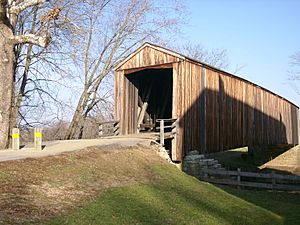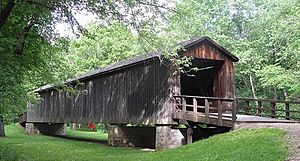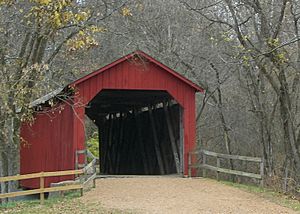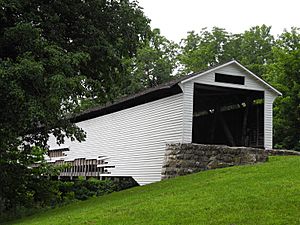List of covered bridges in Missouri facts for kids
Have you ever seen a bridge with a roof and walls? These special structures are called covered bridges, and they look like tunnels over water! Missouri is home to four amazing historic wooden covered bridges. These bridges are super old and important, so the state of Missouri protects them as State Historic Sites. This means they are special places that tell us about the past.
Contents
Discover Missouri's Historic Covered Bridges
These four bridges are the last of their kind in Missouri. They are all looked after by the Missouri Department of Natural Resources. This department works to keep them safe and in good condition for everyone to enjoy.
What Makes a Bridge "Covered"?
Covered bridges are unique because they have roofs and sides, just like a barn or a house. You might wonder why bridges needed to be covered. Well, back in the day, these covers helped protect the wooden parts of the bridge from rain, snow, and sun. This made the bridges last much longer! Without the cover, the wood would rot and wear out quickly. So, the cover was like a giant umbrella and shield for the bridge's main structure.
A Look Back at Missouri's Covered Bridges
Long ago, in the 1800s, Missouri had about 30 covered bridges. As time passed, many of them were replaced or fell apart. By 1967, only five covered bridges were left. The state government decided these bridges were too important to lose. So, on May 25, 1967, a law was passed to protect them. The Missouri State Park Board was given the job of repairing and saving these special bridges. Sadly, one of the five, the Mexico covered bridge, was destroyed in a flood later that same year. This left Missouri with the four beautiful covered bridges we have today.
Meet Missouri's Four Covered Bridges
Each of Missouri's covered bridges has its own unique story and features. They are all examples of clever engineering from a long time ago.
Burfordville Covered Bridge
- Location: Burfordville in Cape Girardeau County
- Built: 1858
- Length: 140 feet (about 43 meters)
- Crosses: Whitewater River
- Design: This bridge uses a "Howe truss" design. This is a type of framework that helps the bridge be strong and stable.
- Fun Fact: It's part of the Bollinger Mill State Historic Site. It was fixed up in 1971 and again in 1998 to keep it in great shape.
Locust Creek Covered Bridge
- Location: Linn County
- Built: 1868
- Length: 151 feet (about 46 meters)
- Crosses: A dry channel of Locust Creek
- Design: This bridge also uses the strong "Howe truss" design.
- Fun Fact: It used to carry the original Route 8. Today, there's no longer a stream flowing under it.
Sandy Creek Covered Bridge
- Location: Jefferson County
- Built: 1872
- Length: 76 feet (about 23 meters)
- Crosses: Sandy Creek
- Design: Another example of the "Howe truss" design.
- Fun Fact: This bridge had to be rebuilt in 1884 after it was damaged by a flood. It was restored again in 1984.
Union Covered Bridge
- Location: Monroe County, west of Paris
- Built: 1871
- Length: 125 feet (about 38 meters)
- Crosses: Elk Fork, Salt River
- Design: This bridge uses a "Burr truss" design, which is another type of strong framework.
- Fun Fact: When the Mexico covered bridge was destroyed by a flood, some of its timbers were used to help restore the Union Covered Bridge in 1968. It was restored again in 1988.
These four covered bridges are amazing examples of history and engineering. They remind us of how people built things long ago and how important it is to protect our past.





